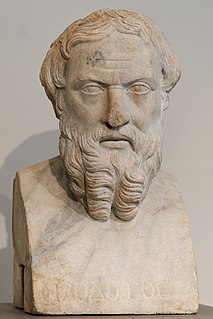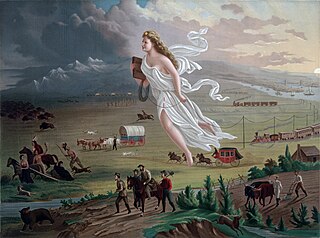
The Brezhnev Doctrine was a Soviet foreign policy, first and most clearly outlined by Sergei Kovalev in a September 26, 1968 Pravda article entitled Sovereignty and the International Obligations of Socialist Countries. Leonid Brezhnev reiterated it in a speech at the Fifth Congress of the Polish United Workers' Party on November 13, 1968, which stated:
When forces that are hostile to socialism try to turn the development of some socialist country towards capitalism, it becomes not only a problem of the country concerned, but a common problem and concern of all socialist countries.

The history of the Soviet Union from 1982 through 1991 spans the period from Leonid Brezhnev's death and funeral until the dissolution of the Soviet Union. Due to the years of Soviet military buildup at the expense of domestic development, economic growth stagnated. Failed attempts at reform, a standstill economy, and the success of the United States against the Soviet Union's forces in the war in Afghanistan led to a general feeling of discontent, especially in the Baltic republics and Eastern Europe.

Mikhail Sergeyevich Gorbachev is a Russian and formerly Soviet politician. The eighth and last leader of the Soviet Union, he was General Secretary of its governing Communist Party from 1985 until 1991. He was the country's head of state from 1988 until 1991, serving as Chairman of the Presidium of the Supreme Soviet from 1988 to 1989, Chairman of the Supreme Soviet from 1989 to 1990, and President of the Soviet Union from 1990 to 1991. Ideologically, he initially adhered to Marxism-Leninism although by the early 1990s had moved toward social democracy.

Perestroika was a political movement for reformation within the Communist Party of the Soviet Union during the 1980s and 1990s and is widely associated with Soviet leader Mikhail Gorbachev and his glasnost policy reform. The literal meaning of perestroika is "restructuring", referring to the restructuring of the Soviet political and economic system.
State capitalism is an economic system in which the state undertakes commercial economic activity and where the means of production are organized and managed as state-owned business enterprises, or where there is otherwise a dominance of corporatized government agencies or of publicly listed corporations in which the state has controlling shares. Marxist literature defines state capitalism as a social system combining capitalism with ownership or control by a state—by this definition, a state capitalist country is one where the government controls the economy and essentially acts like a single huge corporation, extracting the surplus value from the workforce in order to invest it in further production. This designation applies regardless of the political aims of the state and some people argue that the modern People's Republic of China constitutes a form of state capitalism and/or that the Soviet Union failed in its goal to establish socialism, but rather established state capitalism.

"We will bury you!" is a phrase that was used by Soviet First Secretary Nikita Khrushchev while addressing Western ambassadors at a reception at the Polish embassy in Moscow on November 18, 1956. The phrase was originally translated into English by Khrushchev's personal interpreter Viktor Sukhodrev.
Since the emergence of fascism in Europe in the first half of the 20th century, the term "fascist" has frequently been used as a pejorative epithet against a wide range of individuals, political movements, governments, public and private institutions, including those that would not usually be classified as fascist in mainstream political science. It usually serves as an emotionally loaded substitute for authoritarian.

Marxism is a theory and method of working class self-emancipation. As a theory, it relies on a method of socioeconomic analysis that views class relations and social conflict using a materialist interpretation of historical development and takes a dialectical view of social transformation. It originates from the works of 19th-century German philosophers Karl Marx and Friedrich Engels.

The theory of state monopoly capitalism was initially a Marxist doctrine popularised after World War II. Lenin had claimed in 1916 that World War I had transformed laissez-faire capitalism into monopoly capitalism, but he did not publish any extensive theory about the topic. The term refers to an environment where the state intervenes in the economy to protect larger monopolistic or oligopolistic businesses from threats. As conceived by Lenin in his pamphlet of the same name the theory aims to describe the final historical stage of capitalism, of which he believed the Imperialism of that time to be the highest expression.

Criticism of capitalism ranges from expressing disagreement with the principles of capitalism in its entirety to expressing disagreement with particular outcomes of capitalism.
The "Common European Home" was a concept created and espoused by former Soviet General Secretary Mikhail Gorbachev.

The Cold War period of 1985–1991 began with the rise of Mikhail Gorbachev as General Secretary of the Communist Party of the Soviet Union. Gorbachev was a revolutionary leader for the USSR, as he was the first to promote liberalization of the political landscape (Glasnost) and capitalist elements into the economy (Perestroika); prior to this, the USSR had been strictly prohibiting liberal reform and maintained an inefficient command economy. The USSR, despite facing massive economic difficulties, was involved in a costly arms race with the United States under President Ronald Reagan. Regardless, the USSR began to crumble as liberal reforms proved difficult to handle and capitalist changes to the economy were badly transitioned and caused major problems. The Cold War came to an end when the last war of Soviet occupation ended in Afghanistan, the Berlin Wall came down in Germany, and a series of mostly peaceful revolutions swept the Soviet Bloc states of eastern Europe in 1989.

In political and social sciences, communism is the philosophical, social, political, and economic ideology and movement whose ultimate goal is the establishment of the communist society, which is a socioeconomic order structured upon the common ownership of the means of production and the absence of social classes, money, and the state.

"Russians" is a song by Sting, from his debut solo album, The Dream of the Blue Turtles, released in June 1985, and released as a single in November. The song is a commentary and plea that criticises the then-dominant Cold War foreign policy and doctrine of mutual assured destruction (MAD) by the United States and the Soviet Union.
Democratic socialism is a political philosophy that advocates political democracy alongside social ownership of the means of production, with an emphasis on self-management and democratic management of economic institutions within a market or some form of decentralized planned socialist economy. Democratic socialists espouse that capitalism is inherently incompatible with what they hold to be the democratic values of liberty, equality and solidarity; and that these ideals can only be achieved through the realization of a socialist society. Democratic socialism can be supportive of either revolutionary or reformist politics as a means to establish socialism.

Eurocommunism was a revisionist trend in the 1970s and 1980s within various Western European communist parties, which said they had developed a theory and practice of social transformation more relevant for Western Europe. During the Cold War, they sought to undermine the influence of the Soviet Union and the Communist Party of the Soviet Union. It was especially prominent in Italy, Spain and France.
Reformism is a political doctrine advocating the reform of an existing system or institution instead of its abolition and replacement. Within the socialist movement, reformism is the view that gradual changes through existing institutions can eventually lead to fundamental changes in a society’s political and economic systems. Reformism as a political tendency and hypothesis of social change grew out of opposition to revolutionary socialism, which contends that revolutionary upheaval is a necessary precondition for the structural changes necessary to transform a capitalist system to a qualitatively different socialist economic system.

Anti-Leninism is opposition to the political philosophy Leninism as advocated by Vladimir Lenin.
The history of socialism has its origins in the 1789 French Revolution and the changes which it wrought, although it has precedents in earlier movements and ideas. The Communist Manifesto was written by Karl Marx & Friedrich Engels in 1848 just before the Revolutions of 1848 swept Europe, expressing what they termed "scientific socialism". In the last third of the 19th century, social democratic parties arose in Europe, drawing mainly from Marxism. The Australian Labor Party was the world's first elected socialist party when it formed government in the Colony of Queensland for a week in 1899.
On 7 January 1989, Ayatollah Ruhollah Khomeini, supreme leader of Iran, sent a letter to Mikhail Gorbachev, the General Secretary of the Soviet Union. This letter was Khomeini's only written message to a foreign leader. Khomeini's letter was delivered by the Iranian politicians Abdollah Javadi-Amoli, Mohammad-Javad Larijani, and Marzieh Hadidchi. In the letter, Khomeini declared that Communism was dissolving within the Soviet bloc, and invited Gorbachev to consider Islam as an alternative to communist ideology.

















